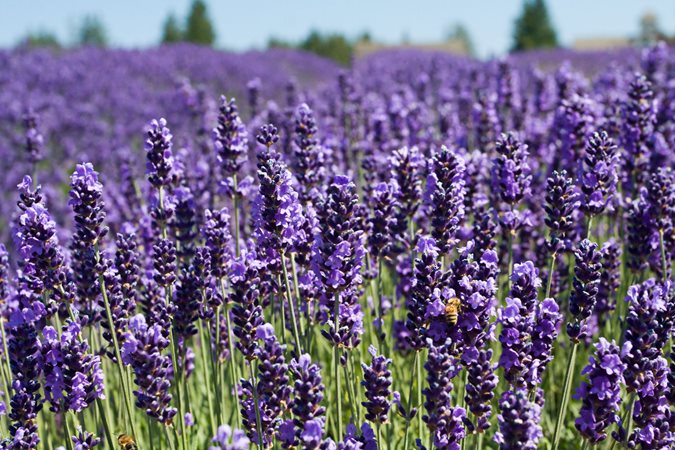Now scientists have confirmed the smell of lavender really does help you unwind.
Japanese researchers discovered mice which were exposed to the aroma of the flower had less signs of anxiety.
The purple shrub may even have potential as a safer alternative to the sleeping pills 'benzos', the study suggests.
Benzodiazepines have been linked to a host of side effects, including memory problems, male breast growth and even birth defects.
Lavender could also be used to calm patients before surgery or those who struggle to take medication, such as young children or the elderly.
The Kagoshima University scientists analysed whether the smell of the vapourised lavender compound linalool helps mice relax.
'In folk medicine, it has long been believed that odorous compounds derived from plant extracts can relieve anxiety,' co-author Dr Hideki Kashiwadani said.
'As in previous studies, we found that linalool odor has an anxiolytic [anti-anxiety] effect in normal mice.'
However, this effect was not seen among rodents without a sense of smell. Linalool must, therefore, trigger 'smell signals' that lead to relaxation.
This contradicts previous theories that suggested linalool gets absorbed like the psychoative drugs benzodiazepines.
Benzos, like Xanax and Valium, enter the bloodstream via the airways and then have a direct effect on brain cell receptors known as GABAARs.
But when the mice were pre-treated with the drug flumazenil, which blocks the drugs, they experienced no calming effects.
The study was published in the journal Frontiers in Behavioral Neuroscience.
'When combined, these results suggest that linalool does not act directly on GABAA receptors like benzodiazepines do,' Dr Kashiwadani explained.
'But must activate them via olfactory neurons in the nose in order to produce its relaxing effects.
'Our study also opens the possibility that relaxation seen in mice fed or injected with linalool could in fact be due to the smell of the compound emitted in their exhaled breath.'
He adds further research is required to determine linalool's safety and efficacy when taken via different routes before it can be tested in humans.
'These findings nonetheless bring us closer to clinical use of linalool to relieve anxiety,' Dr Kashiwadani added.
'In surgery for example, where pre-treatment with anxiolytics can alleviate preoperative stress and thus help to place patients under general anesthesia more smoothly.
'Vaporized linalool could also provide a safe alternative for patients who have difficulties with oral or suppository administration of anxiolytics, such as infants or confused elders.'
Up to 40 per cent of people suffer from anxiety worldwide at some point in their lives.
This comes after research released earlier this year suggested getting less than eight hours sleep a night is linked to the mental health disorder.
Insomniacs are less able to overcome negative thoughts than those who get sufficient shut eye, according to the study by Binghamton University, New York.
The Daily Mail
More about: lavender
















































